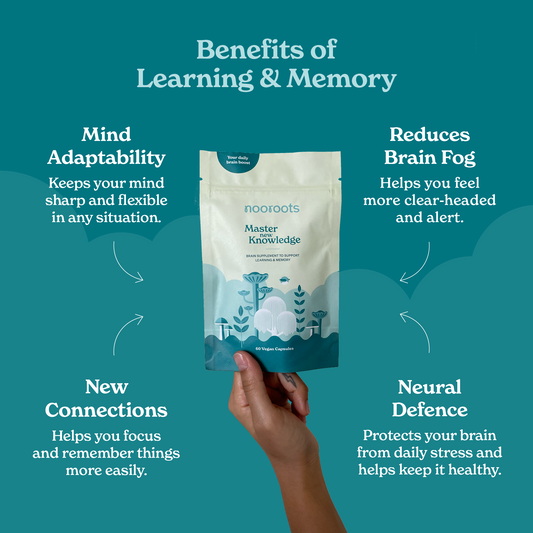Natural nootropics are a class of substances known for their potential to enhance cognitive function, memory, creativity, and motivation in healthy individuals.
Among these, L-Tyrosine stands out due to its role as a precursor to several crucial neurotransmitters, including dopamine, norepinephrine, and epinephrine. These neurotransmitters are vital for maintaining mental performance, especially under stress.
The growing interest in L-Tyrosine as a nootropic stems from its ability to potentially mitigate the adverse effects of stress and improve mental resilience.
This blog will explore the scientific publication "The Antidepressant Effect of L-Tyrosine-Loaded Nanoparticles," exploring the potential of L-Tyrosine in enhancing mental health. By reviewing this study, we aim to provide insights into the innovative use of nanoparticle technology to boost the efficacy of L-Tyrosine as a natural nootropic.
How might L-Tyrosine-loaded nanoparticles revolutionize the way we approach cognitive enhancement and mental health? Let's find out.
Contents
- Background
- Study Overview
- Results
- Discussion
L-Tyrosine Nanoparticles: A New Frontier in Natural Nootropics

Background
L-Tyrosine has a rich history of use, traditionally recognized for its ability to support physical and mental performance. Historically, it has been used in various forms to combat fatigue and improve alertness.
In modern times, L-Tyrosine has gained popularity as a natural nootropic, celebrated for its potential to enhance cognitive function and mitigate the effects of stress.
The general benefits of L-Tyrosine are well-documented. It is reputed to enhance cognitive flexibility and working memory, particularly during demanding tasks or stressful situations. By replenishing the brain's neurotransmitter levels, L-Tyrosine helps maintain optimal cognitive function and supports mental well-being.
This amino acid is also linked to improved mood and reduced symptoms of depression, making it a valuable natural supplement for those seeking to enhance their mental health and cognitive performance.
Study Overview
The study titled "The Antidepressant Effect of L-Tyrosine-Loaded Nanoparticles: Behavioral Aspects" was conducted by Abdelrahman Alabsi, Adel Charbel Khoudary, and Wassim Abdelwahed. It was published in the journal Annals of Neurosciences in 2016.
The primary aim of the study was to investigate the potential antidepressant effects of L-Tyrosine when delivered using a nanoparticle formulation. Researchers sought to determine if L-Tyrosine-loaded nanoparticles could enhance behavioral outcomes in animal models of depression compared to traditional L-Tyrosine solutions and established antidepressants like fluoxetine.
The study involved two animal models: acute stress and chronic mild stress (CMS). A total of 88 male Wistar rats were divided into various groups, receiving either L-Tyrosine-loaded nanoparticles (5 or 10 mg/kg), L-Tyrosine solution (10 mg/kg), fluoxetine (10 mg/kg), or a placebo.
The treatments were administered daily for 21 days. Behavioral assessments included the open field test, forced swim test (FST), and sucrose preference test to measure indicators of antidepressant activity and stress-related behaviors.
Additionally, the in vitro characteristics of the nanoparticle formulation, such as dissolution rate and entrapment efficiency, were evaluated to support the in vivo findings.
Results
The study discovered that treatment with L-Tyrosine-loaded nanoparticles significantly improved several behavioral parameters in the animal models of depression. Key quantitative findings include:
- Forced Swim Test (FST): Rats treated with L-Tyrosine-loaded nanoparticles (10 mg/kg) showed a significant reduction in immobility time. On day 21, immobility time was reduced to approximately 150 seconds compared to over 200 seconds in the control group (p < 0.01). This reduction indicates a decrease in depressive-like behaviour.
- Open Field Test: In the open field test, locomotor activity and rearing counts, which were initially decreased due to stress, were restored in the L-Tyrosine-loaded nanoparticle groups. On day 22, the total activity in the L-Tyrosine-loaded nanoparticles (10 mg/kg) group was almost restored to baseline levels, with a total activity count of around 1,200 compared to 1,500 in the control group (p < 0.01). The traveled distance and rearing counts showed similar improvements.
- Sucrose Preference Test: This test measured anhedonia, a core symptom of depression. After three weeks of treatment, the sucrose consumption in the L-Tyrosine-loaded nanoparticles (10 mg/kg) group increased significantly, with consumption rates reaching approximately 100% compared to around 60% in the stressed control group (p < 0.01). This indicates an improvement in the ability to experience pleasure.
These results were supported by in vitro tests showing that L-Tyrosine-loaded nanoparticles had a high entrapment efficiency of 87.45% immediately after preparation and 66.93% after one month. The dissolution rates of the nanoparticles were 66.54% and 88.65% after 24 and 48 hours, respectively, indicating a prolonged release profile.
The statistical significance of these findings, particularly the reduction in immobility time and increased sucrose consumption, underscores the potential of L-Tyrosine-loaded nanoparticles as an effective antidepressant treatment.
The positive effects are likely due to the restoration of basal levels of cerebral noradrenaline, which warrants further investigation into this innovative delivery method for L-Tyrosine as a natural nootropic.
Discussion
The findings of this study demonstrate that L-Tyrosine-loaded nanoparticles significantly improve depressive behaviors in animal models, suggesting a promising new approach for natural nootropic use. The results align with existing knowledge that L-Tyrosine can enhance cognitive function and reduce stress by replenishing neurotransmitter levels.
However, this study goes a step further by utilizing nanoparticle technology to enhance the delivery and efficacy of L-Tyrosine, providing sustained release and increased bioavailability.
Despite the promising results, there are some criticisms and limitations to consider. The study was conducted on animal models, and while the results are encouraging, human studies are needed to confirm the efficacy and safety of L-Tyrosine-loaded nanoparticles.
Additionally, the long-term effects of nanoparticle use were not addressed, which is a crucial area for future research. The sample size, though adequate for initial findings, should be expanded in subsequent studies to ensure broader applicability.
In practical terms, these findings suggest that individuals seeking natural ways to boost their mental health might consider L-Tyrosine supplements, especially those formulated with advanced delivery systems like nanoparticles. Such supplements could offer improved mood, enhanced cognitive performance, and better stress management, making them suitable for professionals, students, and anyone facing high-stress environments.
Conclusion
The study underscores the potential of L-Tyrosine-loaded nanoparticles as an effective natural nootropic for managing depression and enhancing cognitive function.
The significant improvements in depressive behaviours and neurotransmitter balance highlight the promise of this innovative delivery method.
We encourage readers to explore L-Tyrosine further, consider its potential benefits, and engage with this exciting field of research by sharing their experiences and insights.
Learn more about the vitamins, minerals and natural nootropic plant extracts we use to give your brain a daily boost
- A Beginner's Guide to Ashwagandha
- A Beginner's Guide to Ginkgo Biloba
- A Beginner's Guide to Organic Cacao
- A Beginner's Guide to Holy Basil
- A Beginner's Guide to Rhodiola Rosea
- A Beginner's Guide to Guarana
- A Beginner's Guide to L-Theanine
- A Beginner's Guide to L-Tyrosine
- A Beginner's Guide to Piperine





